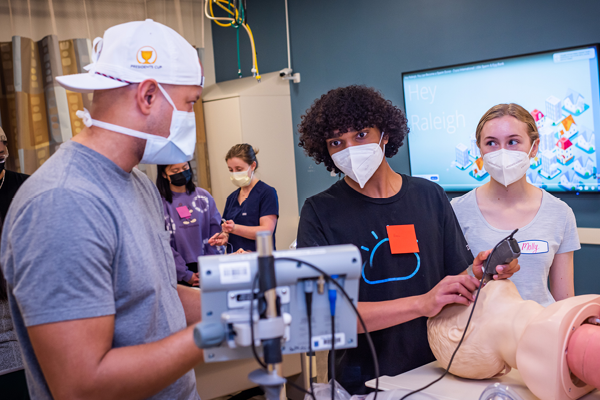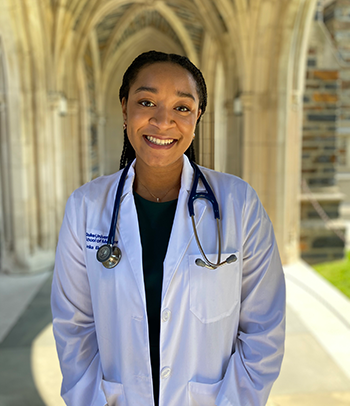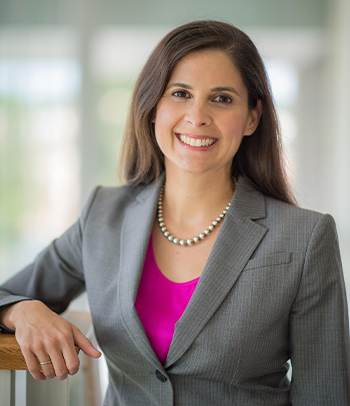
Knowing how to apply to health professions programs, or even what type of careers exist in those fields, can be a mystery for many young people. Without a mentor or parent well versed in the application process, it isn’t always easy to figure out the best path to take toward a successful career in health care.
Leaders of the Duke University School of Medicine Health Professions Recruitment and Education Program (HPREP) aim to make that process less mysterious and more accessible to all students.
HPREP, which has been running for 10 years at Duke, provides professional development and mentoring to historically underrepresented in medicine high school students interested in pursuing a career in health care.
Duke medical students Amika Ekanem and Raiven Harris serve as co-directors of HPREP for 2023. Ekanem said the program is especially beneficial for students who may not have seen someone who looks like them working in certain fields.

“That's how we increase diversity in medicine, by exposing people to what's out there and more importantly, connecting them with people who can serve as mentors and help guide them,” said Ekanem, a second-year medical student.
For eight Saturdays from January through May, students in grades 9 to 11 from Durham and nearby counties come to Duke to participate in hands-on activities, such as CPR training, and receive mentorship. The students also learn interview skills, create a personal statement, and develop presentation skills by working in small groups to present a medical case. This year, 23 students from Alamance, Granville, Person, Orange, and Wake Counties are participating in the program.
HPREP is run and funded by the Duke chapter of the Student National Medical Association (SNMA). At the end of the program each year, three students are awarded a Delano Meriwether Scholarship in the amount of $1,200. SNMA raises funds for the scholarships during its annual Martin Luther King Jr. Banquet held each January.
Pranathi Gorty, an 11th grader at Wilson Preparatory Academy in Wilson, North Carolina, said she always wanted to be a doctor but hopes HPREP will expose her to lesser-known specialties. “Most times when you think of a doctor, you think of pediatricians and dentists,” she said. “But I wanted to see what more there is and see if I might be interested in other fields.”
Maya Urquhart, a ninth grader at Jordan High School in Durham, was moved to consider a career in health care after seeing providers care for an aunt who had breast cancer. Since joining HPREP, she said she has been most excited about “getting hands-on experiences and seeing what it’s like in the medical field.”
Ekanem can speak firsthand to the difference that programs like HPREP can make for students like Pranathi and Maya. She participated in the pipeline program Summer Biomedical Sciences Institute as an undergraduate biology major and chemistry minor at Duke.
“I attribute that to my success in applying to and getting into medical school,” Ekanem said. “I really believe pipeline programs and programs that target underrepresented students in medicine are beneficial and help expose students to the opportunities and career pathways available to them.”
Each Saturday, HPREP has a different focus area. Topics this year have included anesthesiology and emergency medicine. During Anesthesiology Day, the high school students rotated through stations in the Human Simulation and Patient Safety Center in the Trent Semans Center, where anesthesiology residents and faculty taught them the basics of placing IVs and inserting endotracheal tubes in the nasal and oral airways of mannequins. They also listened to a panel discussion that included faculty members, residents, and medical students who offered advice and shared their journeys into medicine.
HPREP volunteers include students from all of Duke’s health profession programs and residents.

Jennifer Dominguez, MD, MHS, an associate professor of anesthesiology and interim associate vice chair for equity, diversity, and inclusion in the Department of Anesthesiology, served on the panel during Anesthesiology Day. She said HPREP and similar programs are important to diversifying the workforce, not only in anesthesiology, but also in all medical specialties and health professions.
“The goal is to encourage more people from racial and ethnic groups that are underrepresented in medicine to the field,” said Dominguez, who led Yale’s version of HPREP when she was a medical student there. “The numbers of physicians from underrepresented racial and ethnic groups are low across specialties with very few exceptions.”
She added that it is important to have a diverse health care workforce to meet the needs of a diverse patient population.
“There has been a lot of literature that suggests that patients do better with a diverse workforce that represents their backgrounds and their interests,” Dominguez said. “Diversifying the workforce is an important strategy to address health inequities.”